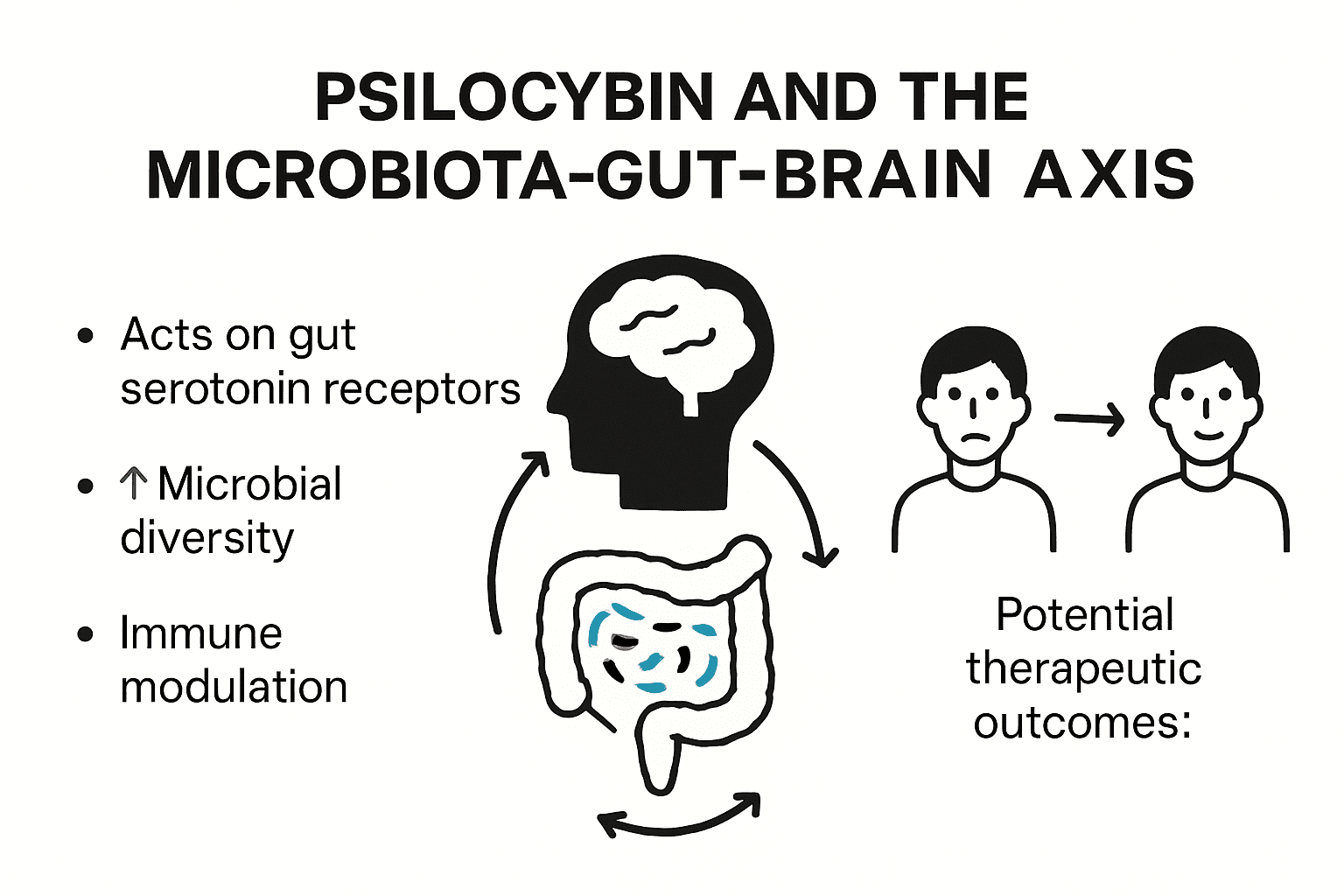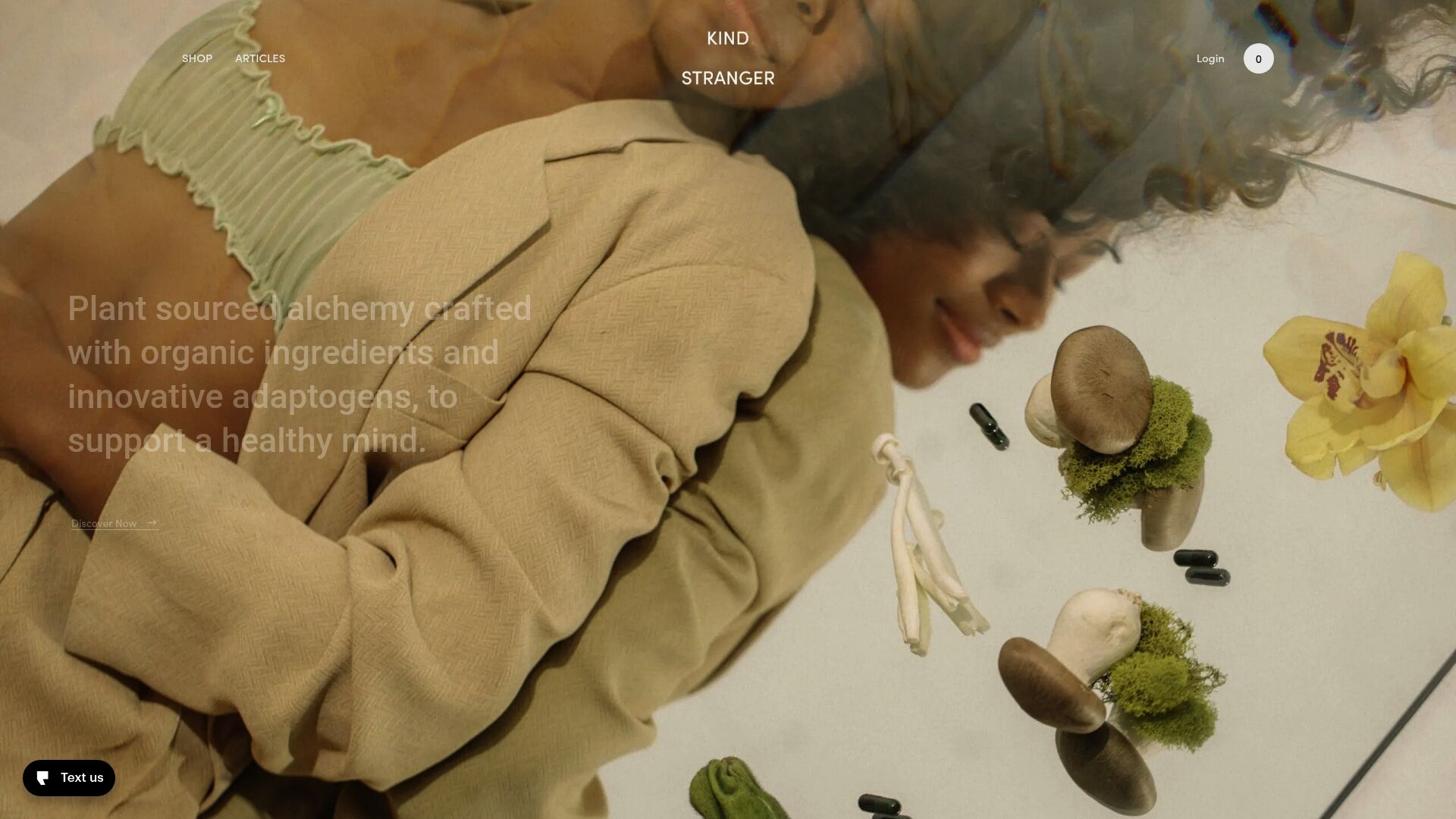Psilocybin is making headlines for its possible breakthroughs in mental health. Yet the science goes deeper than you might think. About 95 percent of your body’s serotonin is actually housed in your gut, not your brain. Most people focus on the mind, but this discovery flips the script and puts your digestive system at center stage. What does it really mean when a compound known for psychedelic experiences could actually influence the core of your body’s wellness? The answers are only starting to surface.
Table of Contents
- Understanding Psilocybin and Gut Connection
- How Psilocybin Impacts Mental Wellness
- Microdosing, Gut Health, and Daily Life
- Canadian Options for Legal Psilocybin Microdosing
Quick Summary
| Takeaway | Explanation |
|---|---|
| Psilocybin may improve gut health. | Psilocybin’s interactions with serotonin receptors in the gut could enhance digestive function and reduce inflammation. |
| Microdosing could support emotional resilience. | Regular microdosing may help individuals maintain psychological balance and improve emotional processing over time. |
| Legal psilocybin access requires professional guidance. | Engaging with healthcare providers can help individuals navigate legal avenues for psilocybin use safely and effectively. |
| Research on psilocybin is still emerging. | Ongoing studies are revealing the complex effects of psilocybin on both mental wellness and gut health, indicating potential therapeutic applications. |
| Therapeutic effects extend beyond immediate experiences. | Long-term benefits may include improved mood and relational dynamics after psilocybin therapy sessions, facilitating lasting psychological change. |
Understanding Psilocybin and Gut Connection
The intricate relationship between psilocybin and gut health represents an emerging frontier in wellness research, revealing profound connections between psychedelic compounds and our digestive ecosystem. As scientific understanding deepens, researchers are uncovering fascinating insights into how these natural molecules might interact with our microbiome and influence overall physiological function.
The Serotonin Receptor Connection
Psilocybin’s primary mechanism of action revolves around its interaction with serotonin receptors, a process far more complex than initially understood. Research from leading neuroscience institutions highlights that these receptors are not exclusively concentrated in the brain but are also extensively present in the gastrointestinal tract. This peripheral presence suggests that psilocybin could potentially modulate gut function through direct serotonergic interactions.
The gut contains approximately 95% of the body’s serotonin, making it a critical site for understanding how psychedelic compounds might influence physiological processes. When psilocybin enters the system, its molecular structure allows it to bind with these receptors, potentially triggering cascading effects that extend beyond traditional neurological responses. These interactions could influence gut motility, secretion, and potentially the overall inflammatory response within the digestive system.
Microbiome Interactions and Potential Therapeutic Implications
A groundbreaking review exploring the microbiota-gut-brain axis suggests that psychedelics like psilocybin might play a more nuanced role in gut health than previously recognized. Preliminary studies indicate that these compounds could potentially influence microbial diversity and communication pathways between the gut and the brain.
While current research is still in early stages, initial findings from rat studies demonstrate intriguing patterns. These investigations suggest that psilocybin and related compounds might interact with gut microbiota in ways that could have broader implications for understanding digestive wellness and mental health connections.
The potential therapeutic landscape is expansive. Researchers hypothesize that psilocybin’s interactions with the gut might contribute to managing conditions characterized by inflammatory responses, altered gut permeability, and disrupted microbiome compositions. However, it is crucial to emphasize that these are emerging research directions requiring substantial further investigation.
For those interested in exploring more about the potential mental health benefits associated with psilocybin, our comprehensive guide on natural anxiety relief offers additional insights into the broader wellness implications of these fascinating compounds.
As scientific understanding continues to evolve, the connection between psilocybin and gut health represents an exciting frontier of wellness research. The intricate molecular dance between these compounds and our internal ecosystems promises to unlock new perspectives on holistic health and potential therapeutic interventions.
To clearly distinguish the key mechanisms through which psilocybin interacts with gut health, the following table summarizes the primary processes and their implications as discussed above:
| Psilocybin Mechanism | Area of Action | Potential Impact |
|---|---|---|
| Interaction with serotonin receptors | Gut (95% of body’s serotonin) | Modulates gut motility, secretion, and inflammation |
| Influence on microbiome diversity | Microbiota-gut-brain axis | May affect microbial diversity and communication between gut and brain |
| Modulation of inflammatory pathways | Digestive system | Could reduce inflammation and manage gut-related conditions |
How Psilocybin Impacts Mental Wellness
Psilocybin represents a groundbreaking approach to mental wellness, offering potential transformative pathways for individuals struggling with complex emotional and psychological challenges. Unlike traditional pharmaceutical interventions, this natural compound demonstrates unique mechanisms for supporting mental health and emotional resilience.
Neuroplasticity and Emotional Processing
Research from leading psychiatric institutions reveals that psilocybin can profoundly impact brain function by enhancing neuroplasticity. This fundamental process allows neural networks to reorganize, form new connections, and potentially reset entrenched emotional patterns. The compound appears to temporarily disrupt default brain networks, creating opportunities for individuals to experience psychological flexibility and alternative perspectives on deeply ingrained emotional responses.
Neuroimaging studies suggest that psilocybin facilitates increased communication between brain regions that typically operate independently. This enhanced connectivity could explain why individuals report breakthrough experiences in understanding their emotional landscapes. By temporarily reducing the brain’s rigid cognitive patterns, psilocybin may help individuals process traumatic memories, break cycles of negative thinking, and develop more adaptive emotional responses.
Mood Regulation and Psychological Resilience
Psilocybin’s interaction with serotonin receptors extends beyond immediate neurological effects, potentially offering long-term benefits for mood regulation. Clinical observations indicate that carefully administered psilocybin experiences can result in sustained improvements in emotional well-being, with participants reporting reduced symptoms of depression and anxiety.
The compound’s unique ability to induce profound psychological insights appears to trigger what researchers call “reset” mechanisms. These experiences can help individuals reframe personal narratives, confront unresolved emotional challenges, and develop enhanced psychological resilience. The therapeutic potential lies not just in the immediate experience but in the lasting psychological integration that follows.
Interestingly, the psychological benefits seem to extend beyond symptomatic relief. Many individuals report increased emotional awareness, improved interpersonal relationships, and a deeper sense of connection to themselves and their environment after controlled psilocybin experiences.
For those interested in understanding potential considerations before exploring psilocybin, our comprehensive wellness guide provides valuable insights into responsible and informed usage.
While promising, it is crucial to emphasize that psilocybin is not a universal solution. Mental wellness is complex, and individual experiences can vary significantly. Professional guidance, controlled environments, and personalized approaches remain essential for safe and effective exploration of psilocybin’s potential therapeutic applications.
As research continues to unfold, psilocybin represents a fascinating frontier in mental health treatment. Its ability to offer new perspectives, facilitate emotional processing, and potentially reset entrenched psychological patterns offers hope for individuals seeking alternative pathways to mental wellness.
Microdosing, Gut Health, and Daily Life

Microdosing psilocybin represents a nuanced approach to wellness that extends far beyond traditional mental health interventions, with emerging research suggesting profound connections between these subtle compound interactions and overall physiological function. The practice involves consuming minimal, sub-perceptual doses that can potentially support comprehensive bodily systems, including the intricate gut microbiome.
Inflammation Reduction and Digestive Wellness
Research published in the journal Life demonstrates promising evidence that psilocybin and related compounds can reduce inflammation in human intestinal tissue models. This groundbreaking finding suggests potential therapeutic applications for individuals struggling with inflammatory digestive conditions. The molecular mechanisms appear to involve complex interactions between psilocybin and cellular inflammatory pathways, offering a natural alternative to traditional anti-inflammatory treatments.
The gut’s inflammatory response plays a critical role in overall health, influencing everything from immune function to mental well-being. By potentially modulating these inflammatory processes, microdosing could represent a holistic approach to supporting digestive system resilience. Individuals reporting improved digestive comfort and reduced systemic inflammation suggest that these molecular interactions extend beyond simple symptom management.
Microbiome Communication and Neurological Integration
Emerging research in Frontiers in Psychiatry highlights the intricate relationship between psychedelics and the microbiota-gut-brain axis. This sophisticated communication network represents a convergence point where physiological and psychological processes intersect. Microdosing appears to potentially enhance this communication, supporting more integrated neurological and digestive functioning.
The serotonin receptor interactions are particularly fascinating. According to research in Trends in Pharmacological Sciences, these receptors are extensively expressed in the gastrointestinal tract, suggesting that microdosing could influence digestive processes through nuanced neurochemical pathways. This means that the benefits of microdosing might extend far beyond immediate psychological experiences, potentially supporting long-term digestive system health.
For those interested in exploring structured microdosing approaches, our comprehensive microdosing schedule guide offers detailed insights into responsible and effective practices.
It is crucial to approach microdosing with careful consideration and professional guidance. While the preliminary research is promising, individual experiences can vary significantly. The complex interactions between psilocybin, gut health, and daily physiological functioning require personalized, informed approaches.
As scientific understanding continues to evolve, microdosing represents an exciting frontier in holistic wellness. The potential to support digestive health, neurological integration, and overall physiological balance offers a compelling perspective on natural, comprehensive approaches to well-being. The journey of understanding these intricate molecular interactions is just beginning, promising future insights into how subtle compound interventions might support our body’s remarkable self-regulating systems.
To help readers compare the primary reported benefits and considerations regarding microdosing psilocybin for gut health, the following table provides a summary:
| Reported Benefit | Description | Consideration |
|---|---|---|
| Inflammation reduction | May decrease intestinal and systemic inflammation | Effects still emerging |
| Improved digestive comfort | Users report less digestive discomfort | Varies by individual |
| Enhanced microbiome communication | Supports gut-brain axis function | More research needed |
| Neurological integration | Fosters gut and brain communication | Needs medical guidance |
| Holistic wellness support | Promotes systemic balance beyond single symptom relief | Personalized approach |
Canadian Options for Legal Psilocybin Microdosing
Navigating the landscape of legal psilocybin access in Canada requires careful understanding of current regulations, research initiatives, and therapeutic pathways. While the legal framework remains complex, recent developments have opened nuanced opportunities for individuals seeking potential wellness applications of this remarkable compound.
Clinical Trials and Therapeutic Exemptions
Health Canada’s current regulations indicate that no approved therapeutic products containing psilocybin currently exist for general public use. However, the government has created specific pathways for individuals to access psilocybin through carefully controlled mechanisms. Clinical trials and section 56(1) exemptions under the Controlled Drugs and Substances Act represent the primary legal avenues for exploring psilocybin’s potential therapeutic applications.
In a significant move towards advancing scientific understanding, the Canadian government invested nearly $3 million in June 2023 to support clinical trials. These research initiatives focus on exploring psilocybin-assisted psychotherapy for critical conditions including alcohol use disorder, treatment-resistant depression, and psychological distress in advanced-stage cancer patients.
Medical Professional Guided Access

For individuals interested in potential therapeutic applications, the most responsible pathway involves working directly with licensed medical professionals. Specialized healthcare providers can help patients navigate potential clinical trial opportunities or explore individual exemption processes. This approach ensures medical supervision, proper screening, and a structured approach to understanding psilocybin’s potential wellness benefits.
The emerging research suggests that psilocybin interactions extend beyond traditional pharmaceutical interventions. Recent studies examining serotonin receptor interactions highlight the compound’s complex molecular mechanisms, indicating potential for nuanced therapeutic applications across various health domains.
For those seeking comprehensive information about the legal landscape, our detailed guide on psilocybin regulations provides in-depth insights into current Canadian frameworks.
It is crucial to emphasize that self-administration or unauthorized acquisition of psilocybin remains illegal. Responsible exploration requires professional medical guidance, thorough understanding of potential risks, and compliance with existing legal frameworks.
The Canadian approach represents a progressive model of cautious scientific investigation. By supporting rigorous clinical research and maintaining strict regulatory oversight, the country is positioning itself at the forefront of understanding psilocybin’s potential therapeutic applications. As research continues to evolve, individuals interested in exploring these potential wellness pathways must remain informed, patient, and committed to evidence-based approaches.
The journey of understanding psilocybin’s role in wellness is ongoing. Continued scientific investigation, responsible regulatory frameworks, and collaborative medical research will ultimately determine the compound’s place in future therapeutic strategies.
Frequently Asked Questions
What is the connection between psilocybin and gut health?
Psilocybin may improve gut health by interacting with serotonin receptors in the gut, which can enhance digestive function and reduce inflammation.
How does psilocybin impact mental wellness?
Psilocybin affects mental wellness by promoting neuroplasticity, improving emotional processing, and potentially leading to long-term benefits for mood regulation and psychological resilience.
What is microdosing, and how can it benefit gut health?
Microdosing involves taking sub-perceptual doses of psilocybin, which may support gut health by reducing inflammation and enhancing gut-brain communication.
How can I legally access psilocybin for therapeutic purposes in Canada?
In Canada, individuals can access psilocybin through clinical trials and therapeutic exemptions under Health Canada’s regulations, typically with guidance from licensed medical professionals.
Ready to Support Your Gut and Mind Naturally?
If you found the science in this article eye-opening, you already know how deeply psilocybin connects mental wellness to gut health. Maybe you are seeking relief from chronic inflammation or want that daily boost in mood and focus without relying on harsh pharmaceuticals. Perhaps you feel frustrated by solutions that overlook the powerful relationship between the gut, serotonin, and emotional resilience. At Kind Stranger, we understand that true wellness needs a holistic approach. Our microdosed psilocybin capsules and gummies are crafted for people who value both physical and mental clarity. Find easy-to-follow guides, real product stories, and expert answers to your legal and dosing concerns for the Canadian wellness journey.

Experience the change for yourself. Begin your personal path to gut and mind balance with plant-based solutions. Discover our wellness-focused psilocybin microdosing options on Kind Stranger. If you want to learn more about safe schedules and real-life results, explore our microdosing schedule guide or see what makes natural anxiety relief with psilocybin different. Now is your time to feel better from the inside out.
Recommended
- Psilocybin for Social Anxiety: Natural Relief in 2025 • KIND STRANGER
- Psilocybin and Mental Health: Natural Solutions for 2025 • KIND STRANGER
- Psilocybin Microdosing Schedule Guide 2025: Safe and Effective Plans • KIND STRANGER
- Psilocybin Side Effects: What Wellness Seekers Need to Know 2025 • KIND STRANGER
- What Is an Herbal Consultation? – Plentiful
- Meditation is More Than You Think – Plentiful


Comments
There are no comments yet.